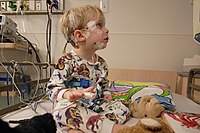
Ontological insecurity II: Relationship to attachment, childhood trauma, and subclinical psychotic-like experiences.
Sign Up to like & getrecommendations! Published in 2019 at "Journal of clinical psychology"
DOI: 10.1002/jclp.22905
Abstract: OBJECTIVES To examine ontological insecurity as a predictor of positive psychotic-like experiences (PLEs) relative to concepts of childhood trauma, parental bonding, and adult attachment style. METHODS A nonclinical sample (N = 298) completed the Ontological Insecurity Scale… read more here.
Keywords: ontological insecurity; childhood trauma; like experiences; psychotic like ... See more keywords

Proneness to psychotic-like experiences as a basic personality trait complementing the HEXACO model-A preregistered cross-national study.
Sign Up to like & getrecommendations! Published in 2022 at "Personality and mental health"
DOI: 10.1002/pmh.1537
Abstract: The goal of the study is to investigate the relationship between the HEXACO personality model and Disintegration-representing a broad spectrum of psychotic-like experiences and behavioral tendencies (Perceptual Distortions, General Executive/Cognitive Impairment, Enhanced Awareness, Paranoia, Mania,… read more here.
Keywords: like experiences; study; disintegration; personality ... See more keywords

Most at‐risk individuals will not develop a mental disorder: the limited predictive strength of risk factors
Sign Up to like & getrecommendations! Published in 2021 at "World Psychiatry"
DOI: 10.1002/wps.20852
Abstract: World Psychiatry 20:2 June 2021 vehicle for indicated prevention of psychosis, one of the recent criticisms of the approach, echoed by Fusar-Poli et al, derives from the NEMESIS-2 cohort report that antecedent mood disorders account… read more here.
Keywords: risk; indicated prevention; psychotic like; health ... See more keywords

Psychotic-like experiences and correlation with childhood trauma and other socio-demographic factors: A cross-sectional survey in adolescence and early adulthood in China
Sign Up to like & getrecommendations! Published in 2017 at "Psychiatry Research"
DOI: 10.1016/j.psychres.2017.03.059
Abstract: Psychotic-like experiences (PLEs) in adolescence are found to be risk factors for later mental disorders. Previous research has also found that childhood trauma has a positive correlation with mental health problems. However, few studies have… read more here.
Keywords: childhood trauma; childhood; like experiences; psychotic like ... See more keywords

Individuals with psychotic-like experiences exhibit enhanced involuntary autobiographical memories
Sign Up to like & getrecommendations! Published in 2019 at "Psychiatry Research"
DOI: 10.1016/j.psychres.2019.01.050
Abstract: The relationship between hallucinations and stressful life events in psychosis is recognised, and has recently been supported by findings showing that the frequency of involuntary autobiographical memory and future projection predicts hallucination-proneness in the general… read more here.
Keywords: involuntary autobiographical; autobiographical memories; like experiences; psychotic like ... See more keywords

Sleep quality moderates the association between psychotic-like experiences and suicidal ideation among help-seeking university students
Sign Up to like & getrecommendations! Published in 2021 at "Psychiatry Research"
DOI: 10.1016/j.psychres.2020.113668
Abstract: Suicide is a leading cause of death for young adults, and college-enrolled students are at markedly high risk for suicide. Psychotic-like experiences (PLEs) and sleep difficulties are prevalent among college students and have been linked… read more here.
Keywords: quality; like experiences; psychotic like; suicidal ideation ... See more keywords

Psychotic-like experiences among 9,564 Kenyan adolescents and young adults
Sign Up to like & getrecommendations! Published in 2021 at "Psychiatry Research"
DOI: 10.1016/j.psychres.2021.113994
Abstract: OBJECTIVE To investigate the prevalence and characteristics of psychotic-like experiences (PLE) in a large cohort of Kenyan adolescents and young adults. METHOD The Washington Early Recognition Center Affectivity and Psychosis (WERCAP) Screen was used to… read more here.
Keywords: kenyan adolescents; adolescents young; like experiences; psychotic like ... See more keywords

Psychotic-like experiences, trauma and related risk factors among “left-behind” children in China
Sign Up to like & getrecommendations! Published in 2017 at "Schizophrenia Research"
DOI: 10.1016/j.schres.2016.09.030
Abstract: BACKGROUND Large scale migration of workers due to wage differences across regions of China has separated millions of children, called "left-behind children" from their parents. Psychotic-like experiences (PLEs) are thought to be associated with childhood… read more here.
Keywords: experiences trauma; risk; like experiences; psychotic like ... See more keywords

Maternal and paternal cannabis use during pregnancy and the risk of psychotic-like experiences in the offspring
Sign Up to like & getrecommendations! Published in 2018 at "Schizophrenia Research"
DOI: 10.1016/j.schres.2018.06.067
Abstract: Cannabis use continues to increase among pregnant women. Gestational cannabis exposure has been associated with various adverse outcomes. However, it remains unclear whether cannabis use during pregnancy increases the risk for offspring psychotic-like experiences. In… read more here.
Keywords: cannabis; pregnancy; cannabis use; like experiences ... See more keywords

Advice weighting as a novel measure for belief flexibility in people with psychotic-like experiences
Sign Up to like & getrecommendations! Published in 2020 at "Schizophrenia Research"
DOI: 10.1016/j.schres.2019.12.016
Abstract: Jumping to conclusions and bias against disconfirmatory evidence are two cognitive biases common in people with psychotic-like experiences and psychosis. However, many participants show comprehension problems doing traditional tasks; new paradigms with additional applied scenarios… read more here.
Keywords: belief; advice; like experiences; psychotic like ... See more keywords

Adverse childhood experiences and psychotic-like experiences are associated above and beyond shared correlates: Findings from the adolescent brain cognitive development study
Sign Up to like & getrecommendations! Published in 2020 at "Schizophrenia Research"
DOI: 10.1016/j.schres.2020.05.045
Abstract: Adverse childhood experiences (ACEs) are associated with increased risk for psychotic-like experiences (PLEs). However, ACEs and PLEs are also both associated with several shared factors (e.g., internalizing symptoms, suicidality). Few studies have explicitly examined whether… read more here.
Keywords: shared correlates; like experiences; psychotic like; adverse childhood ... See more keywords